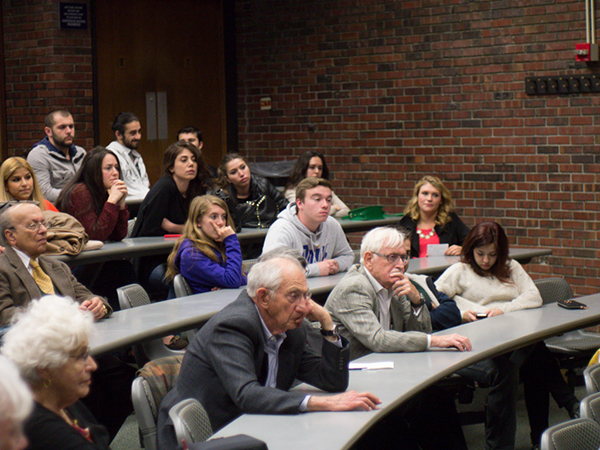

On Wednesday, April 23, The Center for Middle Eastern Dialogue at SUNY New Paltz hosted John VanderLippe, a former New Paltz professor, to discuss the challenges of oppressive rule in Turkey and the Middle East in a lecture titled “Blood, Sweat and Tear Gas: Challenges to Autocracy in Turkey and the Middle East.”
Currently, VanderLippe is an associate professor of history at The New School For Social Research in New York City. VanderLippe became an academic leader in the discussion of the modern Middle East and western perceptions. His teachings at The New School focus on the history of the Turkish Republic and relations between the United States and Middle East over the past century.
VanderLippe outlined three specific movements in recent Middle Eastern History.
VanderLippe began by discussing the Green Movement in Iran. He explained that the Iranian Green Movement was a political uprising that took place after the country’s presidential election of 2009.
The election, between Mir Hussein Moussavi, a popular Iranian reformist, and Mahmoud Ahmadinejad, an Iranian conservative party leader, led to Iranian protesters demanding Ahmadienejad be removed from the presidential office, VanderLippe said.
VanderLippe said many Iranians felt the election was fraudulent and wanted to know “where’s my vote?”
VanderLippe addressed the revolutionary wave of protests and demonstrations known as the Arab Spring. He said since December of 2010, both violent and non-violent riots have broken out in up to twelve different Middle East countries. These nations included but were not limited to Egypt, Libya, Syria, Yemen, Jordan, Kuwait, Tunisia and Iraq, VanderLippe said.
The reasons for the uprisings included distrust of the local government and huge gaps in wealth. He said many of these countries have been successful in removing their leaders and push towards democratic rule.
During the presentation, other scholars from New Paltz were asked for their opinions on the matter.
“Even though there is commonality across the Middle East, each country’s protests and challenges are unique,” Clinton Bennett, an adjunct professor of philosophy at New Paltz, said.
Vanderlippe noted the importance of the Gezi Park protests in Turkey.
On May 1, 2013, groups were prohibited from having a demonstration at Gezi Park, even though the May Day demonstrations were accepted as an annual tradition at Gezi Park. The Turkish government refused to allow protesting because of “ongoing construction” in the park. On May 27, 2013, 50 Turkish protestors decided to gather against the approval of the Turkish government, but protestors were violently evicted from Gezi Park.
This action by the Turkish government sparked an “occupation-like movement,” VanderLippe said. On June 1, Turkish people gathered together in protest for 15 days, bringing together a variety of individuals to protest against the oppressive Turkish government.
Across the Middle East and Turkey, VanderLippe said individuals are rising up against oppressive governments using violent and non-violent tactics of civil disobedience.
